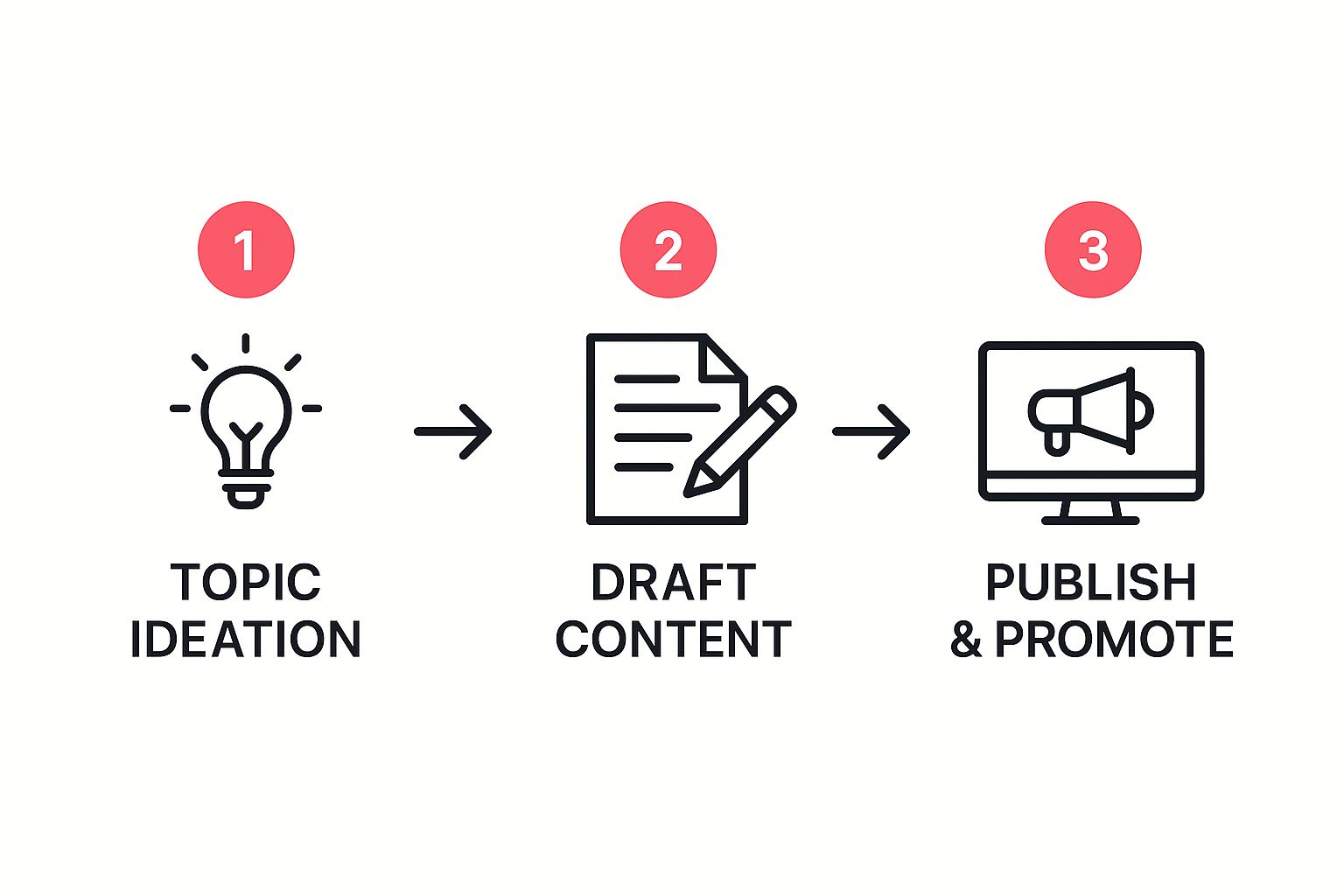How to Increase Organic Traffic Right Now
Learn how to increase organic traffic with our guide. We share actionable SEO and content strategies that deliver real growth and boost your visibility.

Organic search drives a staggering 53% of all website traffic, yet most businesses struggle to capture their share. The key isn't just creating content; it's a three-pronged attack.
You must perfect your technical SEO foundation, create genuinely helpful content that outshines competitors, and build enough authority that search engines see you as a trusted source. This guide will show you how to master all three.
Why Organic Traffic is the Bedrock of Your Business
Chasing organic traffic isn't just another marketing task—it's the key to long-term, sustainable growth. Think about it: these aren't people you're interrupting with an ad.
They are actively searching for what you offer. That built-in intent is why organic visitors are often more engaged and much more likely to convert.
The Undeniable Power of Search
The numbers don't lie. Organic search is still the king of website traffic, driving a staggering 53% of all visits online.
That's a huge piece of the pie you can't afford to ignore- more than half of your potential customers are looking for you through a search engine. A smart SEO plan ensures they find you, not your competition.
Build Your Foundation with On-Page SEO

Before you think about backlinks or technical fixes, you need to get your on-page SEO in order. This is your chance to send clear signals to search engines about what your content is about.
On-page SEO is all about optimizing the elements on your actual pages—the things you have direct control over, like your title tags, headers, and the content itself. The point is to align these elements with the exact terms and questions your audience is typing into Google.
The Role of Keyword Research
This is where solid keyword research becomes your best friend. It helps you uncover the language your potential customers use, so you can stop guessing.
Once you have those keywords, weave them naturally into the most important spots on your page. This simple act helps both search engines and human visitors quickly grasp what your page offers.
Create High-Value Content That Actually Ranks
Let’s be honest: content is the engine of any serious SEO strategy. But just pumping out blog posts won't increase organic traffic.
High-ranking content does one thing exceptionally well: it gives a searcher exactly what they're looking for, and then some. It's about providing comprehensive, genuinely helpful answers that your competitors haven't bothered to cover.
Think Deeper, Not Just Longer
This means creating pillar pages, ultimate guides, and in-depth resources that position you as the go-to expert. The average word count for a first-page result on Google is around 1,447 words.
That’s a clear signal that Google rewards thoroughness. When you nail this, the payoff is huge—the top organic result typically gets a staggering 27.6% click-through rate. Yotpo published some great organic traffic growth statistics if you want to dive into more numbers.

The workflow for creating this kind of content is a full-cycle process. Strategic planning before you type and promotion after you publish are just as critical as the writing itself.
Finding the Balance: On-Page SEO vs. Content Quality
A common mistake is focusing too much on technical on-page SEO tweaks while neglecting content quality. You need both to succeed; think of them as two sides of the same coin.
On-page SEO makes your content discoverable by search engines, while great content makes it valuable to humans.
Here’s a breakdown of how these two elements work together.
| Factor | On-Page SEO Focus | Content Quality Focus | Combined Impact |
|---|---|---|---|
| Title Tags | Includes the primary keyword, is under 60 characters, and is compelling. | Accurately reflects the content's promise and entices the user to click. | A well-optimized title earns the click, and the quality content that follows reduces bounce rate, signaling a good user experience to Google. |
| Headings (H1, H2) | Uses keywords naturally within headings to provide structure for search engine crawlers. | Creates a logical, scannable structure that helps readers easily navigate the content. | Crawlers understand the content's hierarchy, and users can find what they need quickly, increasing time on page. |
| Keyword Usage | Strategically places the main keyword and related terms in the introduction, body, and conclusion. | Integrates keywords and synonyms in a way that feels natural and answers the searcher's intent. | The page ranks for its target query, and the content reads smoothly, building trust and authority with the audience. |
| Internal Linking | Connects related pages on your site to pass authority and help search engines discover more of your content. | Provides helpful, contextual links that guide users to more relevant information, enriching their experience. | Site architecture is strengthened for SEO, and users are kept engaged, moving them deeper into your site and closer to conversion. |
Ultimately, the goal is to create content so good that on-page optimization feels like a natural extension of its value. When you get this synergy right, you create a powerful flywheel that consistently drives organic traffic.
Drive Authority with Strategic Link Building

Think of backlinks as votes of confidence. When another website links to yours, they're essentially telling search engines, "Hey, this content over here is legit and valuable."
Earning high-quality links is one of the most powerful things you can do to drive more organic traffic. This is how you build real authority.
Focus on Quality Over Quantity
But let's be clear: not all links are created equal. A single backlink from a well-respected site in your industry can be worth more than dozens of links from random, low-authority domains.
The name of the game is relevance and authority. Your strategy should focus on earning links that don't just boost SEO metrics, but also send you qualified referral traffic. For a more detailed look, check out these proven link building best practices.
Get Your Technical SEO in Order
Think of technical SEO as the foundation of your entire strategy. If you get this part wrong, your fantastic content and hard-earned backlinks could fail to deliver results.
It's all about making it incredibly easy for search engines to find, crawl, and understand your website.
Technical SEO Essentials
So, where do you start? Focus on the essentials first. Your site needs to be fast, secure with HTTPS, and look great on a mobile phone.
From there, you'll want to check a few more boxes:
- Clean URL Structure: Are your URLs short, descriptive, and easy to read?
- XML Sitemap: This is a map for search engines, showing them all the important pages you want them to index.
- Robots.txt File: This file tells search engine crawlers which parts of your site they should and shouldn't access.
Make a habit of checking Google Search Console for any crawl errors or broken links. Keeping your site's technical health in top shape is a core principle behind all successful white hat SEO tactics.
Measure and Multiply Your Traffic Gains

Boosting your organic traffic isn't a "set it and forget it" kind of deal. Think of it as a feedback loop where you take action, analyze the results, and refine your strategy.
This is the secret to turning small, initial gains into massive, sustainable growth over time.
Key Tools and Metrics
Your two best friends in this process will be Google Analytics and Google Search Console. Keep a close eye on your key metrics—like organic sessions, keyword rankings, and click-through rates.
The reason we obsess over organic traffic is simple: it delivers incredible ROI. Conversion rates for organic visitors often land between 2.7% and 3.75%, consistently beating paid search campaigns. You can dig deeper into these insights on organic traffic conversions to see just how valuable this channel is for your bottom line.
Frequently Asked Questions
How Long Does SEO Take to Show Results?
This is the big question, isn't it? The honest answer is that SEO is a long game, so you have to be patient.
Generally, you can expect to see meaningful results from your efforts within four to six months. Lasting impact comes from consistent, dedicated work over time.
What's the Difference Between On-Page and Off-Page SEO?
Think of it this way: on-page SEO is everything you control directly on your website. This includes your content quality, title tags, meta descriptions, and internal linking structure.
Off-page SEO covers actions you take off your website to build its reputation. The biggest piece of this puzzle is building high-quality backlinks from other credible sites.
Does Social Media Actually Help Organic Traffic?
While a "like" or a "share" isn't a direct ranking signal, social media plays a vital supporting role. A vibrant social media presence gets more eyes on your content.
This drives referral traffic and increases the chances that others will discover your content and link to it naturally.
Ready to build the high-authority backlinks that drive serious organic traffic?
Join Linkyleap and connect with thousands of verified websites ready to partner with you.


